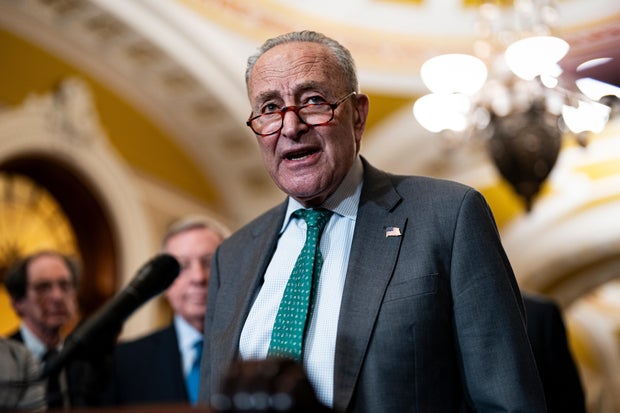Washington — Senate Democrats are contemplating a strategy that would facilitate a GOP proposal to ensure government funding for six months, in exchange for an inevitable failed vote on their own 30-day alternative, confront the dilemma of either allowing the Republican bill to advance or risking a government shutdown.
The Senate is scheduled to consider the House-approved bill to sustain government funding through September starting on Friday. Since Republicans require 60 votes to invoke cloture and move forward with the legislation, backing from Democrats is essential for the final voting process.
With government funding set to lapse on Friday night, Democrats recognize their ability to obstruct the GOP bill but are also concerned about the repercussions of a government shutdown should they choose to do so. As a workaround, Democratic leaders are advocating for a 30-day funding extension that would provide additional time for discussions on new spending measures — a proposal unlikely to gain traction given Republican dominance in both the House and Senate.
A potential resolution began taking shape after Senate Democrats convened on Capitol Hill Wednesday. The proposal would involve Democrats supplying the necessary votes to propel the GOP bill forward in exchange for a vote on an amendment featuring their own one-month stopgap measure, which is expected to fail. Democrats opposed to the GOP version could subsequently oppose its final passage, allowing some members to maintain their positions while averting a shutdown.
“I believe we will all be ‘no’ on cloture unless we reach an agreement to propose at least this 30-day clean [continuing resolution] amendment and possibly a few others,” Sen. Tim Kaine of Virginia informed reporters Thursday morning. “Thus, we’ll be ‘no’ on cloture unless we secure that agreement. I’m not certain if the Republicans have agreed yet, but we will be ‘no’ on cloture without it, and I think that’s a unified stance.”
The House passed the six-month funding bill on Tuesday, primarily along party lines, shifting the funding contention to the Senate.
Senate Majority Leader John Thune mentioned to reporters Thursday morning that his office has been in contact with Minority Leader Chuck Schumer’s team, although no formal proposal has been put forth by the Democrats. Thune observed that if Democrats desire a vote on the 30-day continuing resolution in exchange for aiding Republicans in reaching the 60 votes necessary for the House-approved bill, Republicans are “open to that.”
“We’re awaiting their decision on how they wish to proceed,” he stated. Thune initiated cloture on the House-approved bill Thursday night, setting the stage for a vote on Friday.
Democrats left Wednesday’s meeting advocating for their alternative proposal that would maintain government funding until April 11. Schumer cautioned Republicans that they lack the votes to endorse the House-approved stopgap bill, which proposes an increase in defense spending and funding for veterans’ healthcare, while reducing non-defense spending below 2024 levels.
“Government funding should be a collaborative venture. However, Republicans have opted for a partisan route, crafting their continuing resolution without any input, any input, from congressional Democrats,” Schumer remarked.
Despite the usual bipartisan support for government funding, Democrats broadly oppose the bill and have expressed discontent with the spending cuts, voicing concerns that it would empower the Trump administration and Elon Musk’s Department of Government Efficiency to implement even deeper cost-reduction measures. The threat of a shutdown represents one of the few leverage points available to Democrats while in the minority across both chambers.
Nonetheless, Democrats also fear the consequences of a shutdown, which could be exploited as a rationale for the Trump administration to impose further cuts across the federal workforce. Some Senate Democrats perceive the strategy of voting for cloture but against final passage as a means to navigate these challenges, while more vocal progressives have criticized the tactic, alleging the party is yielding to the president and Republicans without gaining anything significant in return.
“I hope Senate Democrats realize there is nothing clever about orchestrating a fake failed 30-day CR first to turn around & vote for cloture on the GOP spending bill,” New York Democratic Rep. Alexandria Ocasio-Cortez conveyed on X Thursday. “Those games won’t deceive anyone. They won’t mislead voters, nor House members. People will remember.”
Sen. John Fetterman of Pennsylvania, the only Democrat who openly stated he would support the House-approved bill, similarly criticized the notion of trading support for cloture for a vote on the short-term continuing resolution.
“The House GOP CR will then clear the Senate since it only needs 51 votes,” Fetterman expressed in a post on X. “Total theatrics are neither honest with constituents nor a persuasive argument.”














 Bengali (Bangladesh) ·
Bengali (Bangladesh) ·  English (United States) ·
English (United States) ·